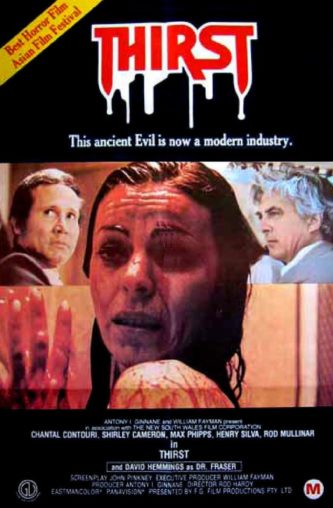 This Australian vampire thriller from the late seventies is an above average example of its type. It may not have a whole lot going for it cinematically, but is worth seeing due to a uniquely perverse script that wickedly updates the vampire myth to the eighties and beyond.
This Australian vampire thriller from the late seventies is an above average example of its type. It may not have a whole lot going for it cinematically, but is worth seeing due to a uniquely perverse script that wickedly updates the vampire myth to the eighties and beyond.
The late seventies-early eighties period was something of a golden age for Aussie-sploitation, with THIRST appearing in 1979 alongside the likes of PATRICK (‘78), LONG WEEKEND (’78), MAD MAX (’79), ROADGAMES (’81), STRANGE BEHAVIOR (’81) and ESCAPE 2000 (a.k.a. TURKEY SHOOT; ’81). THIRST’S producer Anthony I. Ginnane actually performed the same chore on at least two of the other films listed above, as executive producer William Feyman did on three of them while composer Brian May scored five.
Conclusion: the Australian film industry was and continues to be an extremely insular landscape (while we’re at it we might as well mention director Richard Franklin and screenwriter Everett De Roche, who are among the other names that tend to recur among the films listed above, though not on this one), which makes it all the more impressive when something as defiantly unique as THIRST appears. It unfortunately marks the only screen credit of scripter John Pinkney, a former journalist whose audacity and imagination shine through even when the filmmaking leaves something to be desired.
Kate Davis, a pretty young woman, finds herself in the sights of a mysterious organization whose members inexplicably have her kidnapped. She’s taken to a tiny village nestled in a remote forest, a rigidly controlled environment that’s run like a small corporation. Hordes of zombie-like people wander the grounds whose sole purpose is to have their blood sucked and then packaged in milk containers for consumption by members of the Hyma Brotherhood, a group of people with an insatiable thirst for blood (and who dislike the term Vampire). Kate, it seems, is a descendant of Elizabeth Bathory, the notorious real life “Bloody Countess” (whose nefarious deeds were detailed in films like COUNTESS DRACULA, IMMORAL TALES and DAUGHTERS OF DARKNESS, as well as Andrei Codrescue’s novel THE BLOOD COUNTESS); the Brotherhood is looking to unite Kate’s bloodline with its own in an effort to ensure their immortality.
But first Kate will have to be forcibly brought around to the Brotherhood’s way of thinking. She escapes but is quickly recaptured and subjected to a series of psychological tests designed to break down resistance to her inner vampire. The process appears to work in the Brotherhood’s favor, but it’s all an act on Kate’s part. With the help of the sympathetic Dr. Fraser, Kate manages to escape via helicopter, but in fact the good doctor isn’t nearly as upstanding as he appears…
Director Rod Hardy’s career has been largely confined to the television arena, so it’s no surprise that THIRST, his first feature (George Miller, of THE MAN FROM SNOWY RIVER fame, was originally set to direct), looks and feels like it belongs on TV. That’s despite the widescreen photography, which does little to enhance Hardy’s staid and uninspiring visual compositions. Yes, there are a few effective bits, but much of the film simply falls flat. This is particularly evident in the druggy third act, which aims for a hallucinatory ambiance in the mold of Hardy’s fellow countryman Peter Weir but feels tacky and forced. Brian May’s obnoxiously over-insistent score is another liability, while the lead performance by Chantel Contouri sorely lacks the devilish charisma and seductiveness the role requires. Once again, it’s the script by John Pinkey that makes THIRST what it is, a good film that could have been far better.
Vital Statistics
THIRST
F.G. Film Productions
Director: Rod Hardy
Producer: Anthony I. Ginnane
Screenplay: John Pinkney
Cinematography: Vincent Monton
Editor: Philip Reid
Cast: Chantel Contouri, Shirley Cameron, Max Phipps, Henry Silva, Rod Mullinar, Amanda Muggleton, Robert Thompson, Rosie Sturgess, David Hemmings, Walter Pym, Lulu Pinkus, Chris Milne, Jacqui Gordon, Val Christensen, Glenys O’Brien, Ben Nightingale, Stephen Clark, David Vella
